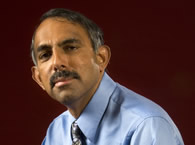News Release: Research, School of Medicine, School of Public Health
Jun. 11, 2009
NIH Awards Emory and Global Partners $3 Million Contract for Cardiometabolic Disease Research
 K. M. Venkat Narayan, MD, MSc, MBA. Listen to Dr. Narayan discuss work in south Asia in the latest edition of Sound Science.
K. M. Venkat Narayan, MD, MSc, MBA. Listen to Dr. Narayan discuss work in south Asia in the latest edition of Sound Science.The National Heart, Lung and Blood Institute (NHLBI) of the National Institutes of Health has awarded Emory University and the Public Health Foundation of India (PHFI) a $3 million, five-year contract to establish a Global Center of Excellence for Prevention and Control of Cardiometabolic Diseases in South Asia.
The PFHI/Emory Center of Excellence will also receive additional funding from the Ovations Chronic Disease Initiative of the UnitedHealth Group.
The grant will be used to study the burden and risk factors for cardiovascular disease and diabetes in India and Pakistan and investigate ways to prevent the diseases. The Center will also help train young scientists in those countries to conduct important diabetes and heart disease research, and promote active collaboration of Emory faculty and students in global health research.
The PHFI/Emory Center will be headquartered in New Delhi, India, at the Public Health Foundation of India.
"This Center of Excellence represents a wonderful example of a mutually beneficial partnership in research and training between Emory University and the Public Health Foundation of India," says K. Srinath Reddy, MD, president of the PHFI. "The Center will make a tremendous contribution to the prevention and control of cardiometabolic diseases in South Asia."
"More people die worldwide and in developing countries from cardiovascular disease and diabetes than from malaria, HIV and tuberculosis combined," says Emory Center of Excellence principal investigator K. M. Venkat Narayan, MD, MSc, MBA, Ruth and O.C. Hubert Professor of Global Health and Epidemiology, Rollins School of Public Health, Emory University.
"Our Center will be part of a network of research centers that the NHLBI is establishing to prevent cardiovascular disease primarily but also diabetes and other related diseases," adds Narayan.
The South Asia region includes three of the top 10 countries in the world in terms of total diabetes subjects (India, Pakistan and Bangladesh), and is the region with the highest number of diabetes-related deaths. Asian Indians are projected to account for about 40 percent to 60 percent of the global cardiovascular disease burden over the next 10 to 15 years. In addition, 35 percent of cardiovascular disease-related deaths in India occur in people aged 35 to 64 compared to just 12 percent of people in those age groups in the United States.
The funds for the Emory Center of Excellence were awarded under the "UnitedHealth and NHLBI Collaborating Centers of Excellence (COEs)" network. Each COE is led by a research institution in a low- or middle-income developing country paired with at least one partner academic institution in a developed country to enhance research and training opportunities. The NHLBI is awarding 10 contracts totaling more than $34 million in this effort.
The PHFI/Emory Center of Excellence researchers will first establish three surveillance cohorts in Chennai and New Delhi, India, and Karachi, Pakistan, and will test 4,000 people in each of the cities for heart disease and its risk factors. Researchers will then follow those sampled to determine who develops heart disease in the future.
"The Center's strategies are two-fold," says Narayan. "First, what can we do to postpone the occurrence of heart disease and diabetes or prevent it, and second, once someone develops diabetes, what can we do to better control the disease and prevent its complications."
In addition, the PHFI/Emory Center will recruit 1,200 people living with diabetes in India and Pakistan to test the effectiveness of various diabetes and heart disease treatment and care-delivery strategies.
The Center's partners include the Madras Diabetes Research Foundation in Chennai, India, the All India Institute of Medical Science in New Delhi, and Aga Khan University in Karachi, Pakistan, and the U.S. Centers for Disease Control and Prevention (CDC).
Emory and the Madras Diabetes Research Foundation previously established a joint Global Diabetes Research Center in Chennai that was funded by Emory's Global Health Institute.
###
The Robert W. Woodruff Health Sciences Center of Emory University is an academic health science and service center focused on missions of teaching, research, health care and public service. Its components include schools of medicine, nursing, and public health; Yerkes National Primate Research Center; the Emory Winship Cancer Institute; and Emory Healthcare, the largest, most comprehensive health system in Georgia. The Woodruff Health Sciences Center has a $2.3 billion budget, 17,000 employees, 2,300 full-time and 1,900 affiliated faculty, 4,300 students and trainees, and a $4.9 billion economic impact on metro Atlanta.
Learn more about Emory’s health sciences:
Blog: http://emoryhealthblog.com
Twitter: @emoryhealthsci
Web: http://emoryhealthsciences.org
